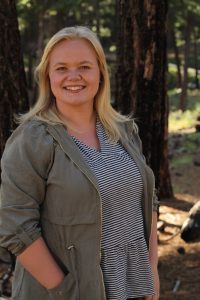Alumni Q&A: Katie Palmer on Missiles 101 and the ACME Survival Guide
Based on July 2020 interview

Katie Palmer
- ACME Class of 2018
- Raytheon, Systems Engineer
- Defense, Engineering, Aerospace
Highlights
- Although they overlap on projects, there are differences between working in government (FBI, NSA) and working at a contractor (Raytheon, Lockheed Martin). Learn the differences by getting an internship.
- Advice to succeed in ACME: (1) set boundaries with school work, (2) get organized with a calendar or to-do list, (3) work in a group, and (4) learn ACME material to understanding the first time you see it.
- Learning quickly is the meta-skill you learn in ACME.
Full Q&A
Tim Riser: Let’s start by creating the chance for ACME students to get to know you a little bit. Could share your personal background, where you’re at right now professionally, and how you got there?
Katie Palmer: My dad is in the military and I grew up moving around all over the place. I’ve always kind of been interested in government work because that’s what I’ve seen my dad do my whole life. In high school, when people were asking me what I wanted to do when I grew up, I told them I wanted to be a cryptanalyst at the NSA. There’s not a lot of high schoolers who even know what the NSA is, let alone what a cryptanalyst is. Between my junior and senior years of ACME, I ended up doing an internship at the FBI in their Cyber division, where I got to work on some cool projects with some of the intelligence analysts and agents. I learned a lot from that internship, and I continued working with them through my senior year of ACME. After I graduated, I got an offer from the NSA, which was my dream job, and I actually turned it down and chose to work at Raytheon instead. I had met Raytheon at the STEM career fair at BYU. They interviewed me on the spot, called me down for a second interview, gave me an offer, and I accepted. Now I live in Tucson. I’ve been working at Raytheon for two years and there’s a lot of opportunity here.
Tim Riser: What drew you to your current work at Raytheon?
Katie Palmer: I learned a lot at my internship with the FBI about what it’s like working directly in the government. The FBI is not the Department of Defense, it’s the Department of Justice. I learned that I didn’t want to go into the Department of Justice. A word to the wise to anyone out there who is wondering: even if you don’t enjoy your internship as much as you’re hoping, you can still learn a lot from it. I learned that I didn’t want to go directly into the government like I had originally thought. Instead, I wanted to go into a contracting role. The role of the government in contracting work is supervisory: they check in on the big ideas and make sure that people are following through on the contracts. It’s the contractors who kind of put in the legwork and are down in the weeds, doing the grunt work, doing the analysis, providing results, and writing the documents. I was more interested in that analysis than in getting into the managerial role of the government. Getting down in the weeds was the attractive part to me; being able to actually work with the problems and come up with solutions as opposed to having problems presented to me and hearing offered solutions. You can get this experience at other defense contracting companies like Lockheed Martin or Boeing, not just Raytheon. For me, I chose Raytheon over the other two because I felt like there was more emphasis on analysis work. Because Boeing and Lockheed Martin have contracts with the government for airplanes and other things aside from missiles, the opportunity for my skill set as a non-engineer was a little more limited at those companies. I chose Raytheon because I felt like there was more opportunity for analysis work.
Tim Riser: Can you describe what analysis work means at Raytheon?
Katie Palmer: Raytheon builds missiles, primarily, and hardware and software portions on the missile, and that’s where all the mechanical and electrical engineers work. My team doesn’t work with the hardware or software directly on the missile. Instead, we take the missile specs given to us by the engineers and run the specs through simulations in a Monte Carlo fashion to determine how survivable the missile would be in different hypothetical situations: varying weather conditions, flying through some sort of enemy territory. It’s a lot of asking, “If I tweak this input, how does this affect the output?” or, “If I fly this way, does it make me more survivable?” That’s primarily what my job is. A lot of the models already exist, and my team has spent a lot of time putting together a tool set that combines multiple models to produce a single output. We’ve created a user interface and automated the analysis process so that people who don’t know anything about analysis can put something in and get reliable results out. I spend a lot of time coding in Python to process large amounts of inputs and outputs and wrap the models in a user interface. We make sure that there’s space in the automation so that if assumptions or contract requirements change, it’s easy for someone to update the existing models.
Tim Riser: What are the broad areas that you do model as areas of sensory input?
Katie Palmer: We work a lot with radar. I’ve had to learn a lot about radar since I started working because it’s so important to the missile. Radar is how missiles understand and “see” their environment.
Tim Riser: What are other common questions ACME students might have about your work?
Katie Palmer: I remember when a Raytheon representative came and actually talked to our ACME class around the time of the STEM career fair. Some people were asking about how it feels going to work building missiles that could eventually be used to harm. The answer was insightful to me and something that I have embraced as well: if you do your job well enough, you won’t ever have to use it. Our job is to protect the warfighter.
Tim Riser: What has surprised you about working at a large government contractor?
Katie Palmer: First off, it’s massive. It’s like a little city. At the Tucson site alone, they have different clubs for employees. If you’re a veteran or if you want to support veterans, you can go to a group. If you’re interested in machine learning, there’s a network for that. They have a young employee network. There’s a doctor on site and a fitness center. They have health centers. It’s really like a small city. Even though I’ve been here two years, I still don’t fully understand the scope of everything that we do. A lot of that is because it’s so big and I’m in my own little area, but there’s also just so much to learn.
Tim Riser: Can you tell me a little bit about your team and the people you work with on a day-to-day basis?
Katie Palmer: I actually work with Cassie Fernelius, in the ACME class of 2017. She and I are on the same team and we sit right next to each other. We have quite a variety of backgrounds on the team aside from me and Cassie coming from an ACME background where we bring in the Python coding skill set. We have people who previously worked in hardware and people who have previously worked in program security. There’s only nine of us, but we have a lot of different skills that we bring to the table and we can all do the same job, which is incredible. One of my co-workers actually graduated with a degree in biology, and she’s now working as a software engineer. It is all about being able to learn on the go and being able to learn quickly because most people don’t go to school and learn how to build missiles. There’s not a Missiles 101 class at most universities. At Raytheon, everybody has had to learn the field from the ground up, and everyone is put on an equal playing field.
Tim Riser: When you interviewed with Raytheon, what made you a good candidate?
Katie Palmer: The main factor was having had an internship with the FBI. I got my government clearance through the FBI and that was a huge factor in getting into Raytheon since my clearance was already done, and Raytheon didn’t need to pay to get it. The fact that I already had one was valuable to them. Once you get it, it’s pretty easy to maintain. If I ever leave the company to someplace that doesn’t require clearance, I would probably have to go through another background check to come back to it. But once you have it, it’s easy to jump around clearance jobs.
Tim Riser: If you were to talk to a room full of students who are interested in working for Lockheed or Raytheon, how would you describe the theory of getting into that field?
Katie Palmer: From my experience, an internship is a good way to get in the door and understand the differences between working in the government and working as a contractor. The government is mostly composed of intelligence and security agencies while contractors build and deliver hardware or software products. Get an internship in a field you’re interested in, even if you don’t need a clearance, so you can start seeing what is available to you.
Tim Riser: Are there any distinctions that have become really clear to you now that you’re two years into your work?
Katie Palmer: The difference between the government sector, the government contractor sector, and the private sector. Each has a different purpose, a different goal, and different types of products, contracts, rules, and regulations.
Tim Riser: What skills have you found to be particularly useful so far in your career?
Katie Palmer: In terms of hard technical skills, the most useful one is the ability to look at a problem and solve it with Python. The government is trying to push open source Python over MATLAB because Python is free and MATLAB isn’t. I was hired into my specific team primarily for my ability to code in Python and to problem solve. In terms of soft skills, the most useful has been the ability to learn quickly. Again, there is no such thing as a Missiles 101 class in most universities! We all start on an equal playing field and we have to learn from the ground up.
Tim Riser: When you said create user interfaces in Python, is that something you picked up while in ACME?
Katie Palmer: No, I went into that totally blind. We use a Python library called TKinter. We had to learn how to make a graphical user interface (GUI) from the ground up. We had to figure out how to organize the different parameters we wanted people to be able to select, determine what sort of visual appearance we wanted it to have, and decide on what hooks we want to leave in for people to apply in the future. It’s been quite a task.
Tim Riser: What’s the dynamic of the team you work with?
Katie Palmer: At Raytheon, you work with two different systems at the same time. So, I go to work every day and work with the same nine people. In that sphere, our team lead makes decisions for the team, helps prioritize what needs to be done, and decides what the timeline is. The team lead communicates information up, down, and across the chain of command. That’s the organization based on what you do every day. There is also another system, which we call functional, where I am grouped with other people I don’t work with every day, but we all have similar skill sets. A lot of new project opportunities with other teams come through that organization structure.
Tim Riser: Have you seen any other corners of Raytheon or other specific groups where the ACME skill sets are valuable?
Katie Palmer: I came into a niche team since almost the entire rest of the program I’m on does hardware. We are the outsiders of the program because we’re the only people not really touching the missile at all. I’ve heard of machine learning opportunities within the company and positions in charge of unit testing or even larger scale analysis than what I do. If you get a network at Raytheon, you can easily find something within the company that’ll fit you. If you’re interested in doing signal processing, there’s plenty of opportunity. Similarly, if you want to do analysis like I’ve been doing, there’s opportunity there. If you want to do machine learning, they are trying to push that across the company. Machine learning is opening up in this industry, just a little slower than in others.
Tim Riser: How well would you say that ACME prepared you for this work environment?
Katie Palmer: The soft skills I learned in ACME were essential to my work: I carried over the ability to learn quickly, the ability to work well under pressure, and the ability to adhere to certain guidelines. I work as a contractor, which means I have to do everything specified by a contract. There are specific technical skills we get in ACME which I don’t use, like neural networks techniques or querying huge databases with SQL, but every day I have to do things that I have never learned before. I’ve been asked to code things in Fortran and MATLAB, which I’ve never taken classes on. Being able to ask questions and not feel judged, being able to work as a team to get things done faster—these are the skills which were key for me in surviving ACME, and which I use on a daily basis in my current work.
Tim Riser: Are there any technical or non-technical topics you wish ACME had covered?
Katie Palmer: Technical writing. I would say probably 30-40% of my work is technical writing. I have to annotate my code. I have to write user manuals and programmer manuals and create training sessions and all sorts of other things tied with the software we’re building.
Tim Riser: What would Katie’s life advice be for people just starting ACME?
Katie Palmer: I came up with a list of four things that I wish I had known my junior year. Number one: set boundaries for yourself. I was really struggling to get enough sleep my junior year trying to balance work, school, and personal life, and I just was not getting enough sleep. My senior year, I committed to getting at least six hours of sleep a night, and that helped me immensely with my ability to do work and cope with ACME my senior year. Set boundaries for yourself that are right for you. Number two: I recommend making a schedule or a checklist and booking out time to do things so you’re not overwhelmed with the amount of work that needs to be done. Number three: work in a group. This is huge. Get in a group as soon as possible and spend your time doing everything for ACME with that group. Number four: Make sure that you take time to understand the material the first time that you go over it. Rather than try and coast on by and then have to cram for a test, do it right the first time. You’re just stressing yourself out even more if you put it off until the test. Those are four things that I think helped me.
Tim Riser: Is there anything else you’d like to tell students?
Katie Palmer: Just don’t be afraid to ask questions. Honestly, I feel like that is a key. It is so hard to get anywhere that you want to go if you don’t ask questions. How can you build a network if you don’t ask people what they do? How can you learn to build a missile if you don’t ask how it’s done? Every single day I have to ask a question. It could be about some acronym I’ve never heard of or it could be about finding a way to optimize a line of code. Be open to learning.
Tim Riser: Thank you, Katie!

